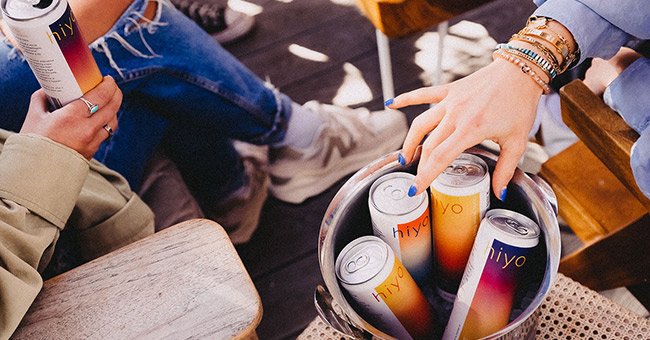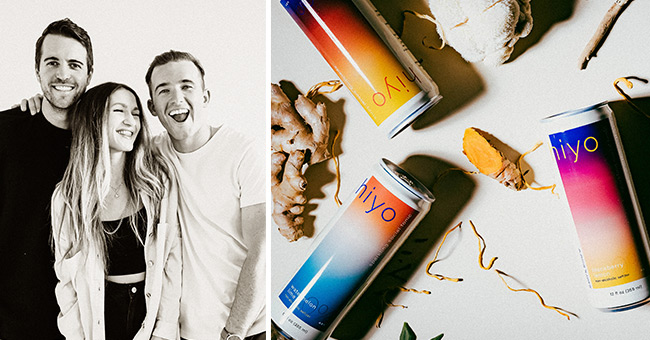
For some, Dry January is just an annually appearing buzzword that comes and goes. Not for hiyo.
Last year, the non-alcoholic drink brand increased sales tenfold and had prepared for a big Dry January push with increased advertising campaigns along with its first commercial that was so successful that the company had to pull back on its marketing efforts in the middle of the month to make sure it had enough inventory. This year, Hiyo beat its total sales from January 2022 in the first two days of 2023 and could have doubled sales during the month if it had more supply to offer.
“This (Dry January) is kind of like our Super Bowl,” CRO and co-founder George Youmans told BevNET. “There’s just really palpable societal tailwinds of just a lot of people getting excited, prioritizing their health, drinking a little bit less to start the year.”
Founded in May 2021 by Youmans, Evan Quinn and Cygne Cooper, the BevNET New Beverage Showdown 22 champion spent its first full calendar building the lifestyle brand around the growing sober-curious, NA drinking trend.
After building momentum online and moving into specialty retail in its home market, the Los Angeles-based brand has been scaling its distribution steadily throughout the U.S. as it tries to break into national specialty retailers and, eventually, conventional chains.
Moving From DTC To Specialty To Conventional
Each 12 oz. slim can of hiyo contains over 1.5 grams of nootropic ingredients like ashwagandha, L-theanine and lion’s mane. Hiyo comes in three varieties: Watermelon Lime, Peach Mango and Blackberry Lemon and retails online for $44.99 per 12-can case.
Recently, hiyo onboarded with KeHE and UNFI for distribution and Critical Mass Group as a broker to build that larger retail footprint and become a household name in the alcohol alternative space. Its goal is to get into at least 1,000 doors with a stretch goal of 2,500 but it is realistic that moving into national, conventional grocery will take time.
“Larger regional or national chains are something that is earned. Very rarely – if ever – is a new category built in places like Walmart or Kroger,” Cooper said. “There has to be a foundation of brand and category awareness before you get into bigger box stores.”
At this point, the brand is continuing to target natural/specialty channels, focusing on large markets like Austin, Houston and Chicago as well as select parts of Florida.
Getting retailers to buy-in to the non-alc trend and dedicate more shelf space to functional NA beverages is a critical step in taking D2C brands offline, Quinn said.
“We most similarly parallel it to the kombucha set,” he said. “Give it a chance [and] it will perform well.”
Part of that strategy is to not only be an alternative to alcohol, but a better-for-you social beverage option. Last fall, hiyo earned its USDA Organic certification which Cooper called a “core goal” of the brand’s mission “to show our customers we care – not only about our beverages, but also about them and how we can help them live healthier, happier lives.”
The organic certification and the fact that it is not branded as a dietary supplement like functional beverage competitor Kin Euphorics may give hiyo an advantage when pitching to national retailers. In store, hiyo sells in single flavor 4-packs or individual cans but buyer data has shown that online the variety packs (one 4-pack of each flavor) sell best. The company is now working on a fourth flavor to be released this year that will round out a 4-can variety pack for retail.

Building Business Opportunities Through Community
Founders Cooper, Quinn and Youmans see the progression of the brand as a way to build a community around sober lifestyles. Quinn and Youmans started the brand after experiencing loved ones hospitalized for alcohol-related issues. Both founders swore off alcohol in solidarity and aimed to offer an alcohol alternative that brought people together in a health-conscious way.
Part of that has been the brand coining its own term – The Float. Hiyo’s founders describe The Float as the stress-relieving, mood-boosting feeling that people usually seek from alcohol but can get from the drink’s functional ingredients instead.
“We definitely want to provide a bit more balance in that [alcohol alternative] space where people can feel that there is this non-alc option that is just as cool, that’s just as fun, that’s just as complex and is just as delightful and enjoyable as their alcoholic counterparts,” Youman said.
One way to do that is to eventually target spaces where people gather to celebrate together like restaurants, bars, festivals and music venues. After continuing to build its community of dedicated online and offline customers this year, the brand expects to wade into the complicated world of DSD networks and foodservice accounts in early 2024.
“I’m sure this is going to cause some groans, but all we truly want to do is change the way the world drinks,” Cooper said. “There is a cultural shift occurring of challenging the status quo in pursuit of a more fulfilling life – dare we say a life never wasted – and if we can look back in a few years and say that we were an instrumental leader in that movement, that will be a dream fulfilled.”